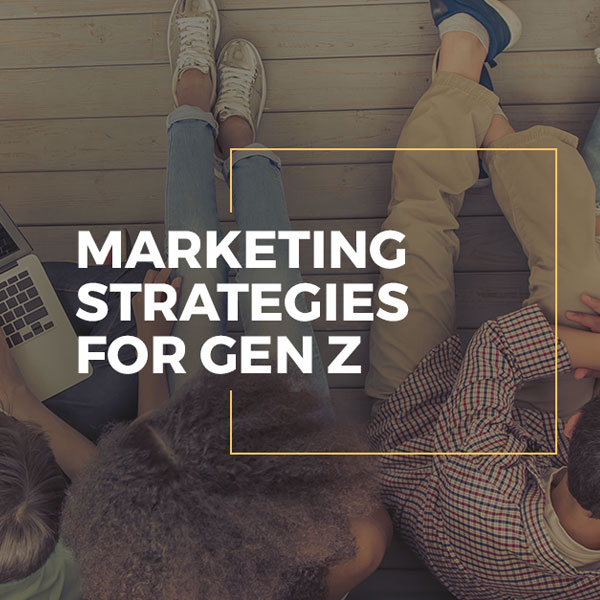
Who is Generation Z and why should companies today care? After all, this younger generation won’t reach full financial independence for another decade. Their Millennial counter parts, on the other hand, now have a little cash left over for discretionary spending after the student loan payments are made. As time marches on, however, Generation Z won’t be youngsters forever.
Digging a little deeper into Generation Z, we find that this new and elusive cohort has the opportunity to be a valuable addition to your target audiences. As brands and companies begin to develop strategies to market to Generation Z, we are taking a look at three things you may not have considered for your Generation Z marketing approach.
Digging a little deeper into Generation Z, we find that this new and elusive cohort has the opportunity to be a valuable addition to your target audiences. As brands and companies begin to develop strategies to market to Generation Z, we are taking a look at three things you may not have considered for your Generation Z marketing approach.
1. Millennials and Z’ers use technology, but differently
Generation Z (or Gen Z or Z’ers) were born after 1995, placing the oldest members around age 20 (The Center for Generational Kinetics). By contrast, Millennials are those who neared adulthood in the 2000s. Both generations grew up with the Internet at their fingertips and have continued to embrace technology for social interactions, shopping and errands, and information gathering. Because Millennials and Generation Z’er’s are close in age and other demographics, many of the marketing strategies that have been developed for that older audience may still apply. However, there are a few key differences at the generational divide.While Millennials saw the advent of widespread technology use in the late 90s as iPods came to the scene, Z’ers grew up with this technology and can’t live without it. The term most marketers use is “Digital Natives”.
digital nativeIn terms of marketing, this means that a digital strategy is no longer an option; it’s a necessity. Members of Gen Z use smart phones as tools, regularly fact-checking or researching new companies and brands. Without a solid digital presence (or at a minimum, a website optimized for mobile), companies quickly lose relevance with these Techies. If your website looks like it hasn’t been updated in a decade —never mind the great things you’re saying — Gen Z’ers won’t stick.
(noun)
A person born or brought up during the age of digital technology and so familiar with computers and the Internet from an early age – Oxford English Dictionary
2. Gen Z processes info & passes judgment more quickly
Another defining factor of Gen Z is how quickly they process information and pass judgment. They are regularly sifting through a dozen tabs open in their web browser while Snapchatting with friends and listening to their favorite Podcast. You get the point. Capturing (and holding) their attention can be tricky.
According to recent headline-grabbing studies, users’ attention spans are a mere 8 seconds. That’s down from 12 seconds in 2000. So what does this mean? Engage them, and engage them quickly. An easy way to do this is with captivating graphics.
A user’s attention span is, on average, a mere 8 seconds.Tweet thisFor your marketing strategy, this means your brand needs to be represented to be in several digital spaces at once. Visually displaying your information is a simple way to combat this 8-second filter, while getting your point across. Our web developer, Kayleigh, has 5 tips on how you can better visually display your information.
3. Z’ers are the entrepreneurial generation
A typical way to engage with Millennials is to pitch your products / services as solutions to their problem (growing up in the recession, they had many). But for Z’ers, they don’t have problems so much as they have ambitions.
Members of Gen Z don’t need a solution to heal their pain-point, rather they need a tool to help them reach their goals. This warrants a huge change in a company’s value proposition when it comes to marketing.
Such as their ad featuring the first ever transgender athlete to make the U.S. Men’s National team.
side hustleUnlike their older Gen Y cousins who are likely to have a side hustle, many Z’ers have already started their own businesses or plan to start a business someday. Entrepreneur shared an interesting break down of this entrepreneurial spirit in Generation Z that describes some of the attributes that may have caused the shift, including
(noun)
Work performed for income supplementary to one’s primary job – Merriam Webster
- Gen Z has access to resources that Millennials didn’t at the same age
- Z’ers can get mentors before Millennials ever could
- Colleges and companies are engaging high school students now
Members of Gen Z don’t need a solution to heal their pain-point, rather they need a tool to help them reach their goals. This warrants a huge change in a company’s value proposition when it comes to marketing.
Brands with marketing strategies that resonate with Generation Z
Samsung
Looking to spark a social media fire, Samsung recently took a step back and utilized a group gaining popularity with Z’ers: social media influencers on Youtube. Their latest ad for the Galaxy S8 features YouTubers doing reviews of the phone.“63% of Gen Z’ers would prefer to see social media influencers in advertisements.” – Contently
Here’s a look at the brand new commercial. These are real, popular tech-review YouTubers. While we don’t know if these were paid endorsements, this style of authentic marketing is really resonating with the younger generation.]]
Nike
Following the authenticity trend comes Nike, who consistently ranks highly with the younger generations. They stand out by incorporating all types of consumers into their campaigns.Such as their ad featuring the first ever transgender athlete to make the U.S. Men’s National team.
It’s time to start thinking about how your company will embrace Gen Z
You might be thinking, “We just pivoted our entire marketing strategy because we were told we needed to engage Millennials! Now we have to pivot again for Gen Z??” The answer is no, not necessarily. However, it is time to start thinking about how your company will react as Z’ers get older.
In the mean time, an up-to-date digital presence tends to resonate well with consumers across the board, not just with Generation Z. If you think your online presence could use some renovation, it’s always better to start sooner rather than later. Because as we’ve learned, you only have 8 seconds to make a splash.
In the mean time, an up-to-date digital presence tends to resonate well with consumers across the board, not just with Generation Z. If you think your online presence could use some renovation, it’s always better to start sooner rather than later. Because as we’ve learned, you only have 8 seconds to make a splash.
